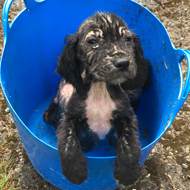
Cocker spaniel has new life after being abandoned in a bucket as a puppy
A puppy that was rescued last year by the RSPCA after being abandoned along with it's siblings s now a qualified sniffer dog working with the Surrey and Sussex Police Dog Unit.
Cocker spaniel Badger was found with his three siblings in a bucket in Redhill, Surrey on 14 July 2019. The puppies were extremely malnourished, had chronic eye and ear infections and were almost bald as a result of severe mange.
The RSPCA collected the puppies and they were taken to the Millbrook Animal Centre, in Chobham. They were given treatment and after many weeks were all rehomed. However, Badger unfortunately had more difficulty settling in than his siblings and he was brought back to the centre.
Jo Douglas from the Millbrook Animal Centre said: “[Badger] was always on the go and needed constant stimulation and he was just too much for his adopters so he came back to us.
“We kept him busy by hiding tennis balls around the centre and playing scent games with him. He absolutely loved it - and was really good at following his nose and finding them so we contacted the police to see if they’d be interested in taking him on as a new recruit!”
Badger trained with the Surrey and Sussex Police Dog Unit and qualified as a sniffer dog earlier this year. Now, at 20 months old, Badger works alongside PC Steph Barrett, sniffing out guns, money and drugs.
PC Barrett said: “I was saddened to hear how Badger had been dumped on the side of the road but, thanks to the RSPCA, he’s been given a second chance. After a lot of love and training, he has regained trust in humans and become a real success story. He’s still very mischievous at times, but that’s all part of the challenge!
“When he hears the radio go off he squeals with excitement and I don’t even have to ask him to get in the van. He’s a joy to work with. He’s hard not to love. He’s still got that cheeky side to him but he’s obsessed with work and he makes me smile all day.”
Image (c) RSPCA.



 The latest
The latest